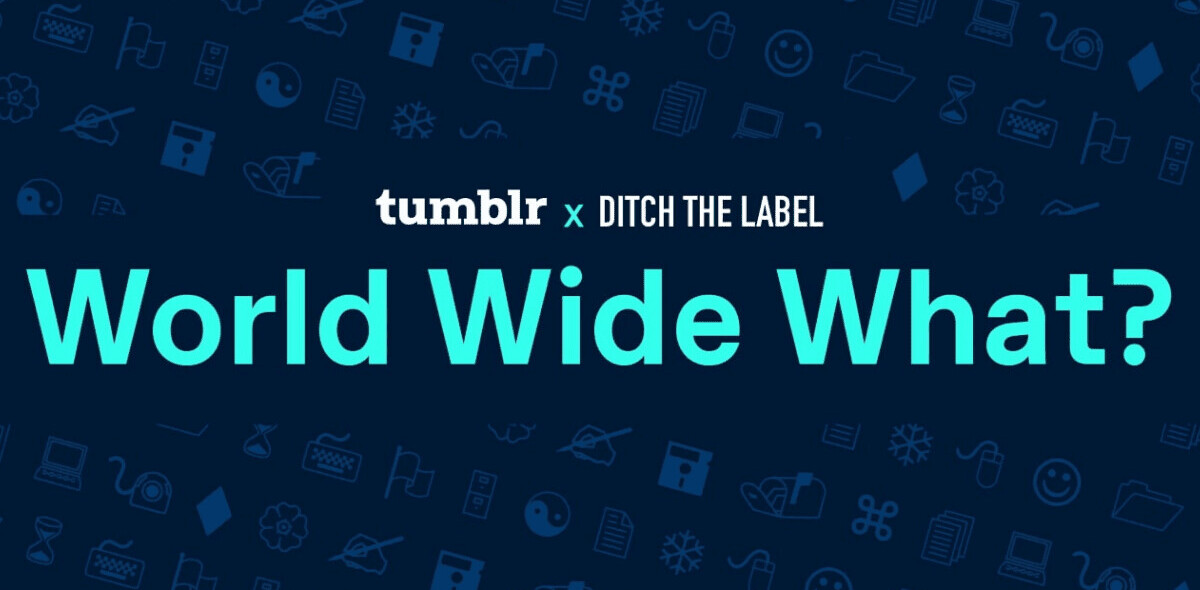
Welcome to our twenty-seventh Tumblr Tuesday, where every Tuesday we celebrate our love of Tumblr by interviewing the mastermind behind a new blog. Tumblr, a New York City based startup, is like the FFFFound for the rest of the world. It’s as shareable and fast-paced as Twitter but populated with more in-depth text and rich images.
In January, we announced that Tumblr serves 120 million people and 15 billion pageviews every month! But Tumblr’s founder and CEO David Karp admits that one area the blogging network hasn’t performed well enough at thus far is content discovery – which is what our weekly column Tumblr Tuesday is all about.
For this week’s Tumblr Tuesday we caught up with the geeky geniuses behind both WTF Mobile Web and WTF QR Codes (that’s right you’re getting 2 for the price of 1 this week!). We first stumbled upon these sites a week or two ago and all shared a laugh in our back channel. Then, people from all over my social networks (techies and non-techies alike) starting sending me these two sites, saying, “Have you seen these? Hilarious!”
Turns out, I went to college with one of the geeky geniuses named Brad Frost, a developer, musician and Brooklyn-based artist who runs these two sites with his cohorts Jen Simmons and Craig Villamor. Check out our interview after the WTF-est of WTF QR codes below.

CBM: Who are the mad genius behind WTF Mobile Web and WTF QR Codes?
Brad Frost: WTF Mobile Web and WTF QR Codes are collaborative efforts between like minds. I’m a mobile web strategist, front-end designer at R/GA and creator of Mobile Web Best Practices. My WTF Mobile Web cohort is Jen Simmons, the brilliant host of The Web Ahead podcast. My partner in crime for WTF QR Codes is Craig Villamor, who is the director of mobile user experience at Salesforce.com. It’s much more fun to laugh with other people who see eye to eye with you about this stuff.
CBM: Which one did you start first and what was the inspiration behind it?
Brad Frost: Jen mentioned that she’d been hoarding screenshots of terrible mobile web experiences. As it turns out I’d been doing the same thing and already had the domain. So the nerd stars aligned, we set up the Tumblr and launched WTF Mobile Web the next day.
The inspiration was to really demonstrate the diversity challenges we’re facing as web creators. All of sudden there’s this explosion of web-enabled devices that demand our attention and we need to figure out how to address it. That’s why it’s almost comforting to see that even the really big guys struggle with these issues.
As for WTF QR Codes, I’ve been collecting miserable QR code experiences for a while now. I got interested in scanning QR codes because they *should* drive to mobile-optimized experiences, and I was curious to see how each experience fared. It became easy to capture all these stupid codes because they started cropping up everywhere: subways, magazines, direct mail, even in bathrooms. Craig saw it too. It’s 8-bit pollution.

CBM: What makes a mobile web experience really horrendous?
Brad Frost: The biggest thing that makes a mobile web experience terrible is not achieving content parity. Whether you’re presented with a message saying “Sorry, your device is not supported”, or you’re forced to download an app, or you’re redirected to the mobile site’s homepage, or you just get a fraction of the real content, you’re not getting what you asked for. That pisses you off. You’re arbitrarily being penalized for the device you happen to be browsing with.
Newer techniques like responsive web design aim to alleviate those fragmentation problems by serving up one site that adapts to many screen sizes. But these new techniques present a whole other slew of problems. Performance is a huge one. I saw a responsive site the other day that weighed over 8MB, which obviously would crush any device not on a strong Wi-Fi connection.

CBM: What about a QR Code attempt?
Brad Frost: QR codes in the hands of marketers are often a disaster. I think a lot of traditional marketers see QR codes as an opportunity to stay relevant in the digital age, so they just started slapping them on everything without considering everything that goes into the experience. It’s like buying a puppy without understanding that you have to feed it, walk it and clean up its crap from your kitchen floor.

CBM: On the flip side, what’s the best use of a QR code that you’ve ever seen?
Brad Frost: There’s definitely some legit opportunities for QR codes, from paying bills to playing web games between screens.
CBM: And what’s been the most pleasurable mobile web experience you’ve ever had?
Brad Frost: I’m a fan of Gmail’s mobile web app, and I find Facebook’s mobile web experience to be more reliable than the native app as of late. As far as sites go, I like how Target’s mobile site works with the constraints of the medium while still delivering a good-looking experience. I think the best mobile web experiences are invisible. You get what you came for without hassle and get on with your day.
CBM: In 5 years time, do you think we’ll still have QR Codes?
Brad Frost: Hopefully not! QR codes are a transitional step toward interacting more directly with our environment, and augmented reality, NFC and real-time photo recognition are all on the cusp of becoming mainstream. I think we’ll ultimately see a drop in QR codes, but technology is unpredictable so who the hell knows.

CBM: In 5 years time, what are you most excited for with the mobile web?
Brad Frost: First, I’m excited to stop calling it “the mobile web” and just call it “the web”. I also think the web has huge potential to serve as the glue that holds our connected world together. We’ll be interacting with more devices of all shapes, sizes and capabilities, and the web has the opportunity to reach them all. Proprietary solutions will always be around and will still do amazing stuff, but it will become increasingly challenging to create experiences for every platform out there. The web’s ubiquity is its superpower and we should take advantage of it.
CBM: iPhone or Android user? Why?
Brad Frost: I’m currently an iPhone user, however I use a lot of different devices. I personally love the iPhone’s camera, but there’s definitely pros and cons to all platforms. I definitely didn’t get lost on the road as much when I was an Android user.
I think it’s really important to accept and embrace device diversity. As web creators we don’t get to choose what devices access our experiences. Our users do and we need to respect the fact that they’re coming from many different places. Because those users are just people who want to get to your content or get something done. It’s definitely challenging to support all these devices, but it’s also a tremendous opportunity to reach people wherever they may be.
➤ WTF Mobile Web and WTF QR Codes
Hope you enjoyed this! Also, check out our Tumblr Tuesday from weeks’ past:
- Clients From Hell features the horrors of the creative biz
- Meet the woman behind Silicon Valley Ryan Gosling
- Meet the man behind “Animals Being Dicks”
- Loot-alikes matches London looters with their celebrity counterparts
- Foodspotting’s Amy Cao picks her top 5 Tumblrs for foodies
- The Fax Blog takes submissions by fax (only if you have the secret #)
- Stocking is the new Planking
- F*ck You Yelper takes down one critic at a time
- Hungover Owls
- Paper Tissue
- CAPTCHArt
- Kim Jong-il Looking at Things
- Magical Game Time
- Hot Chicks of Occupy Wall Street
- Literally Unbelievable
- The Fluffington Post
- Did You Get the Memo?
- Danger is Everywhere
- ANIMALS TALKING IN ALL CAPS
- Nerd Holiday
- Real Menswear
- The Burning House
- Mastergram
- Plaid Forever
- Olympic Non Events
- What Should I Put on My Tumblr?
- CEOs with Shake Weights
- Technically Crunchy
Get the TNW newsletter
Get the most important tech news in your inbox each week.





